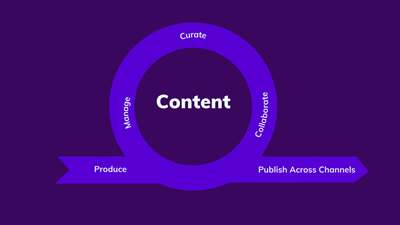Top 7 Azure CMSs in 2024
While many CMS platforms claim they work in Azure cloud, we've picked the top 7 that take full advantage.


Cloud infrastructure has accelerated digital transformation and brought numerous companies into the future. As these businesses seek to embrace innovation and everything the cloud offers, investment in the cloud will continue to rise.
Azure offers several benefits for organizations that choose it for their cloud computing needs. Azure is ideal for deploying a headless CMS when managing and delivering content.
This article will explain what you need to know about Azure and highlight why an Azure headless CMS makes the best choice for your organization.
What Is Azure?
Microsoft Azure is a public cloud computing platform that provides a range of cloud services, including storage, analytics, virtual computing, networking, etc. Azure offers Infrastructure as a Service (IaaS), Platform as a Service (PaaS), and Software as a Service (SaaS) solutions that can be used in conjunction with or in place of on-premises servers.
Microsoft Azure has seen exponential growth since launching in 2010 as Windows Azure and is among the top cloud providers worldwide. Frequently seen as the alternative to Amazon Web Services (AWS), Azure offers an easier learning curve for developers and is particularly popular among enterprise organizations. 95% of Fortune 500 companies rely on Azure for their cloud computing.
Content management has become even more critical to the bottom line for these organizations. They need a platform that can easily integrate with existing Infrastructure to help them meet growing customer expectations and evolving channels. In this case, opting for an Azure headless CMS is a great idea.
Azure CMS
Azure CMS, also known as a Content Management System on Azure, is a cloud-based platform for managing digital content. The Azure CMS is a part of Microsoft's Azure suite of cloud computing services, which provides users with a wide range of tools for building, deploying, and managing applications and services.
The Azure CMS is designed to provide users with a flexible and scalable solution for managing digital content across a range of platforms and devices. The platform is built on the Azure cloud, which provides users with access to a range of powerful tools and services, including virtual machines, storage solutions, and security features.
At its core, the Azure CMS provides users with a set of tools for creating and managing digital content, including web pages, blog posts, images, and videos. The platform includes a range of features for organizing and categorizing content, such as tagging and metadata tools, as well as powerful search and filtering capabilities.
Benefits of Using Azure and Azure Software
The Azure Cloud platform provides over 200 products and services to help organizations build, run and manage applications across multiple clouds, on-premises, and with the freedom to adopt frameworks that best suit their needs. Here are some of the benefits of choosing Azure for deploying your headless CMS:
Security and Compliance
Azure was designed using Security Development Lifecycle (SDL), which ensures that data remains secure while on Azure. This is backed by the 90+ compliance offerings, which safeguard data and streamline compliance.
Analytics
Azure offers cloud-based analytics services that can facilitate business intelligence, data governance, data warehousing, and other analytics needs for an enterprise organization.
Scalability
Azure Storage provides safe, ductile, secure, and performant storage solutions, allowing you to make changes to accommodate more processors and increase your business's scalability.
Learning Curve
Azure leverages familiar tools that most enterprise developers already use, including ASP.NET, Visual Studio, C++, and more, for deploying cloud-native applications. This lowers the learning curve and makes it easier for your IT team to get everything up and dash.
Cost-Effectiveness
Microsoft uses a pay-as-you-go model for Azure, which means that organizations only need to pay for what they use and can expand when and if they need.
Azure Fabric Controller
One of Azure's primary services, Fabric Controller, continuously monitors all hardware states. In case a virtual machine hosting a server becomes unstable, the controller can reset that machine or switch the application to a new one without the intervention of the customer, reducing downtimes and crashes.
Why Use Azure Hosting Instead of AWS or GCP
Azure, AWS, and GCP represent the three most popular cloud-hosting options. However, there are a few reasons why enterprises should opt for Azure over the other two:
Regional Availability
Azure is available in over 60+ regions, more than other cloud providers. By offering more data centers, Azure ensures greater content availability regardless of where customers are located.
Better for Microsoft Enterprises
Several companies rely on Microsoft products, and many can use existing enterprise agreements to reduce licensing costs.
5 Reasons Why Enterprises Should Choose an Azure Headless CMS
Enterprises can leverage many more benefits when choosing Azure for cloud infrastructure. These benefits are amplified when they choose an Azure headless CMS and can enormously impact content management efforts. Here are the reasons to opt for an Azure headless CMS:
More Flexible Development
A headless CMS places no restrictions on what experiences developers can build. Since it relies on an API-first approach, developers can create and deploy applications faster and quickly integrate with existing Infrastructure. They have the freedom and flexibility to choose the best framework or integration method for each use case.
More Reliable Architecture
Headless architecture provides better reliability as it is more secure and scalable with higher availability. When team members don't have to worry about whether or not the CMS architecture is at risk from hackers or might not be capable of handling future needs, they can focus on creating content.
Better Resource Allocation
Enterprises are accustomed to hiring numerous specialists and consultants to help them get the most out of their software. Unlike many legacy and suite platforms, a headless CMS provides better ease of use, leading to better resource allocation. They don't need to hire large teams of developers or marketers to handle a few things and can focus on innovating with smaller groups.
Engaging Omnichannel Experiences
With an Azure headless CMS, companies can finally provide the omnichannel experiences their customers want. Content can be deployed to any channel, whether a tablet, website, mobile application or VR experience. These touchpoints can also be seamlessly connected to provide a cohesive experience across the entire customer journey.
Platforms to Consider
Agility CMS
Agility CMS is an API-first headless CMS platform designed with speed and flexibility. Users receive the tools to build, manage, and maintain their content easily. The content management system includes many features, including built-in Page Management, document management with a media library, and version control.
Kentico.ai
Kentico is a web content management system for building websites, online stores, intranets, and Web 2.0 community sites. The CMS uses ASP.NET and Microsoft SQL Server for development via its Portal Engine, Visual Studio, or Microsoft MVC. Kentico is also compatible with Microsoft Azure.
Azure and Microsoft Cloud enable companies to scale flexibly with scheduled, rule-based auto-scaling. Kentico supports Azure CDN geo-redundant storage, ensuring users worldwide access content quickly, making sites reliable and ready to perform.
Magnolia
Magnolia CMS is an open-source, Java-based web content management system. Magnolia CMS provides the best blend of enterprise power and agility while giving you freedom over your DX stack. Integrate existing IT and business systems for your digital transformation.
Magnolia CMS is fully compatible with Microsoft Azure. The CMS uses the whole spectrum of its capabilities to bring the smoothest experience for developers and IT administrators. The usage of the Azure cloud platform avoids the complexity of the on-premise setup and improves work productivity.
Sitecore
Sitecore is a complete suite of tools with all a marketer needs to create relevant customer experiences, combining a CMS with a database to get contextual information from users.
Sitecore uses Azure to provide an integrated user interface to manage cloud content delivery infrastructure, simplifying deployment. Sitecore Azure is built around Azure PaaS and includes automatic deployment and SQL databases to ensure continuous content delivery.
Agility CMS and Azure: A Lightning-Fast Combination
Agility CMS is an API-first headless CMS platform designed with speed and flexibility. Users receive the tools to build, manage, and maintain their content easily. The content management system includes many features, including built-in Page Management, document management with a media library, and version control.
Marketers can also benefit from workflow management (user restricted access, approval processes), separation of content and design, tagging and content categorization, SEO features, social media integration, end-user interactive features (e.g., commenting, rating), and more. Developers will find it easier to build and deploy applications using APIs and modules that can be added to increase functionality (e.g., integration with an eCommerce system).
With Azure's Platform-as-a-Service products such as Service Fabric, App Service, and Elastic Database Pools and their comprehensive security compliance, Agility CMS' customers can also enjoy fast-loading sites that perform optimally under high traffic and pose no security challenges. Users can also launch blazing-fast static websites using Jamstack without worrying about scaling or maintenance. Everything is powered by Azure, enabling static files to be delivered quickly over a global CDN.
When enterprises choose Azure, they will find a cloud service ranked by Gartner as an industry leader in IaaS, Virtualization Infrastructure, PaaS, and cloud storage services. Azure's rich set of tools, such as SQL Management Studio, API Apps, Mobile Apps, Logic Apps, TFS, and Visual Studio, enables developers to concentrate on building apps and websites that work seamlessly while hosted on-premises or in the cloud.

About the Author
Joel is CTO at Agility. His first job, though, is as a father to 2 amazing humans.
Joining Agility in 2005, he has over 20 years of experience in software development and product management. He embraced cloud technology as a groundbreaking concept over a decade ago, and he continues to help customers adopt new technology with hybrid frameworks and the Jamstack. He holds a degree from The University of Guelph in English and Computer Science. He's led Agility CMS to many awards and accolades during his tenure such as being named the Best Cloud CMS by CMS Critic, as a leader on G2.com for Headless CMS, and a leader in Customer Experience on Gartner Peer Insights.
As CTO, Joel oversees the Product team, as well as working closely with the Growth and Customer Success teams. When he's not kicking butt with Agility, Joel coaches high-school football and directs musical theatre. Learn more about Joel HERE.


